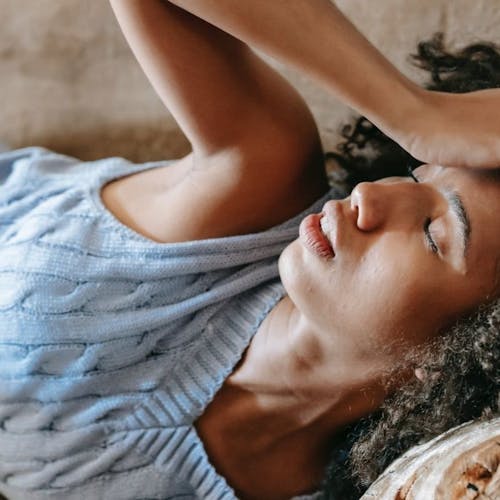This website uses cookies to enhance the user experience. By using Yoppie you are agreeing to our use of cookies.
A Simple Guide To Vaginal Cysts
Written by Yoppie
15 Jul 2020
So...what are vaginal cysts?
Are vaginal cysts dangerous?
What causes vaginal cysts?
What are the symptoms?
When should you see a doctor?
How are vaginal cysts diagnosed?
What about treatment?
Let’s face it, nobody likes talking about vaginal cysts! But in our ongoing mission to help keep your vagina happy and healthy, this is another important topic to cover so you can recognise the signs and feel empowered to take charge of your own vaginal health. Let’s dig in and find out all there is to know. Fun!
So...what are vaginal cysts?
Cysts can develop anywhere on the body. They’re basically lumps filled with either air, fluid, pus or other substances, and they vary in size - some are teeny tiny, and others (very rarely) grow to the size of an orange. They are not usually harmful or painful, though when they develop in awkward areas of the body they can be very uncomfortable, which brings us to…vaginal cysts.
These troublesome little scoundrels can show up on or under the vaginal lining, and are categorised into several types, the most common being:
Vaginal Inclusion Cysts - caused by an injury to the vaginal wall, sometimes appearing after childbirth or surgery
Gartner’s Duct Cysts - this duct is described as a “remnant organ” found in the pelvis after foetal development, and can occasionally fill with fluid and turn into a cyst
Bartholin’s Cyst - found on the labia near the vaginal opening, the Bartholin’s gland can become overgrown by a flap of skin, causing fluid to back up and form a cyst. In rare situations infections can also develop within these cysts leading to a Bartholin’s abscess.
Müllerian Cysts – You may never have heard of these, but they are actually one of the commonest causes of cysts in the vagina! They arise from a duct left behind when you were developing from a little tiny fetus, although you may not notice them until you are in your 20-30s when they can become more troublesome!
Are vaginal cysts dangerous?
Cysts aren’t usually dangerous, however it’s always best to get anything abnormal checked out to make sure it’s not a benign tumour or something else. If your cysts are particularly painful or uncomfortable, speak to your GP so they can prescribe the appropriate treatment, such as antibiotics if the cyst has become infected.
What causes vaginal cysts?
There are a number of causes of vaginal cysts, such as the aforementioned injury to the vaginal wall, skin tears during childbirth (like an episiotomy), a surgical procedure, a buildup of fluid in a gland, and more. They can develop at any age, but Bartholin’s Cysts are typically found in women in their 20s and 30s.
What are the symptoms?
Vaginal cysts are usually relatively painless and don’t cause any other symptoms, however you may experience discomfort during sex or when inserting a tampon, though some women feel no pain or discomfort at all - you may not even know it’s there!
However, cysts can grow in size which eventually leads to pain, irritation, itching, and increased risk of infection, so it is important to keep an eye on symptoms. Vaginal cysts can become infected due to other bacteria or even STIs aggravating them.
In extreme cases, they can lead to an abscess forming, which will need to be drained in order to heal.
When should you see a doctor?
You shouldn’t be suffering needlessly due to a vaginal cyst, as the treatment is often very simple. If you are experiencing any pain or discomfort, or you notice a lump or bulging that remains after 2 or 3 days, see your GP so they can check it over. You should also promptly call a doctor if you are over the age of 40 and notice a lump. Though lumps are common, it’s best to check they are not a sign of something more serious because in rare situations lumps can be a sign of vulval cancer.
How are vaginal cysts diagnosed?
Oftentimes vaginal cysts are discovered by a doctor or nurse during a routine exam, such as a smear test, but if you have signs of a cyst you can ask to see your GP to confirm. It can be embarrassing going to the doctor knowing that you’ll probably have to get your lady bits out, but try not to worry - it’s all very normal!
The doctor may review your medical history, ask about symptoms, and potentially carry out a test for STIs, in order to gauge the best treatment. In rare cases, they may carry out a biopsy to rule out anything more serious, or a scan or ultrasound to get a clearer view of the cyst and any problems it’s causing.
What about treatment?
Vaginal cysts can clear up on their own, however if a cyst remains for a prolonged period of time or becomes infected, they are still easily treatable through a variety of methods, including:
- Antibiotics - used when a vaginal cyst is infected, or if an abscess is present
- Sitz baths - any excuse for a bath! A Sitz bath simply means soaking in warm water several times a day for 3 to 4 days, in order to encourage an infected cyst to burst and drain on its own
- Surgical drainage - for infected or large cysts that pose a problem, surgery using local anaesthetic or sedation may be required
- Marsupialization and Word Catheters – these sound rather exciting, and in fact they are effective treatments for recurring or troublesome cysts that have been drained. They involve a doctor placing stitches around the site of a Bartholins cyst to keep it open, while a rubber tube allows the drainage to continue for longer
- Gland removal - a rare treatment for some cases of Bartholin’s Cysts
Have you ever experienced a vaginal cyst? We’d love to know what treatment worked for you, and what self-care methods you used to relieve any discomfort. We’d love to know how it worked for you. Shout out in our private Facebook group or drop us a note on Insta @itsyoppie. Don't forget that our personalised period box can get organic tampons, PMS supplements and more delivered easily and regularly through your letterbox, which is a whole lot less pain to worry about each month.
Fact checked by Doctor Brooke Vandermolen.
Section jump
Back to top
Subscribe To Our Newsletter
YOPPIE





© 2026 Yoppie is a registered trademark of Phlo Technologies Ltd.
Yoppie's supplements are not a substitute for a varied diet and healthy lifestyle and are not intended to diagnose, treat, or cure any disease. If you are pregnant, breastfeeding, have a medical condition or are under medical supervision, please consult with your doctor before taking any of our products.






